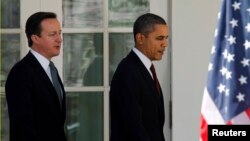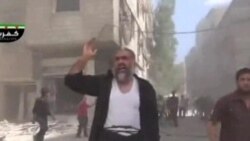THE WHITE HOUSE —
The situation in Syria and efforts to halt bloodshed there will be a major topic on the agenda of talks Monday between President Barack Obama and British Prime Minister David Cameron.
Monday's meeting will cover the range of global issues, including the agenda for next month's G8 Summit, as well as issues such as Iran and Middle East peace efforts.
But the flurry of diplomatic activity on Syria means that issue is likely to dominate the Oval Office talks.
The United States and Russia want to organize an international conference in Geneva to press President Bashar al-Assad and rebels fighting to oust him to engage in peace talks.
Obama has made clear that Assad must "exit the stage" as he recently put it. The U.S., Britain and other partners also continue to gather evidence about possible chemical weapons use in Syria.
Secretary of State John Kerry said in a Google-sponsored event on Friday that a path forward in Syria depends on political willpower and compromise.
"We all owe the world the best effort possible to try to get there and to explore in good faith whether or not we can end the violence, end the bloodshed, avoid a complete disintegration. And my judgment is that if we get to this meeting in Geneva, the arguments will be very clear to everybody as to who is prepared to be reasonable and who is not prepared to be reasonable."
Watch related video by Kent Klein:
At a news conference this past week with South Korea's president, Park Geun-hye, Obama said the U.S. has a national security and moral obligation to end slaughter and ensure a stable Syria.
He said any new U.S. action beyond non-lethal support for Syrian rebels will be based on hard-headed analysis, but added that his record shows he follows through once decisions are made.
"There have been several instances during the course of my presidency when I said I was going to do something - and it ended up getting done."
On chances for success at any international conference on Syria, Michael O'Hanlon of the Brookings Institution is skeptical that Russia would be willing to re-assess and consider a future in Syria without Assad.
"I would be delighted if Russia all of a sudden would become a supportive, cooperative part of this dynamic but I am skeptical, and I think we should probably view this as the beginning of a process that is going to take quite a while to play out and not get our hopes up too high right now."
White House Press Secretary Jay Carney was asked Friday about remarks by Turkey's Prime Minister Recep Tayyip Erdogan, in an NBC News interview, about the use of chemical weapons in Syria.
Citing intelligence reports and other evidence, Erdogan said it is clear the Assad regime has used chemical weapons, adding the Syrian regime passed President Obama's "red line" a long time ago."
Jay Carney repeated President Obama's position that more work needs to be done before a "complete picture" is in hand about chemical weapons.
"In this case we believe very strongly that the intelligence work done here has been very solid but it is not the end of a process, it is closer to the beginning.”
In his NBC interview, Prime Minister Erdogan said he plans to share with President Obama evidence of chemical weapons use in Syria, saying the U.S. needs to take further steps.
Monday's meeting will cover the range of global issues, including the agenda for next month's G8 Summit, as well as issues such as Iran and Middle East peace efforts.
But the flurry of diplomatic activity on Syria means that issue is likely to dominate the Oval Office talks.
The United States and Russia want to organize an international conference in Geneva to press President Bashar al-Assad and rebels fighting to oust him to engage in peace talks.
Obama has made clear that Assad must "exit the stage" as he recently put it. The U.S., Britain and other partners also continue to gather evidence about possible chemical weapons use in Syria.
Secretary of State John Kerry said in a Google-sponsored event on Friday that a path forward in Syria depends on political willpower and compromise.
"We all owe the world the best effort possible to try to get there and to explore in good faith whether or not we can end the violence, end the bloodshed, avoid a complete disintegration. And my judgment is that if we get to this meeting in Geneva, the arguments will be very clear to everybody as to who is prepared to be reasonable and who is not prepared to be reasonable."
Watch related video by Kent Klein:
At a news conference this past week with South Korea's president, Park Geun-hye, Obama said the U.S. has a national security and moral obligation to end slaughter and ensure a stable Syria.
He said any new U.S. action beyond non-lethal support for Syrian rebels will be based on hard-headed analysis, but added that his record shows he follows through once decisions are made.
"There have been several instances during the course of my presidency when I said I was going to do something - and it ended up getting done."
On chances for success at any international conference on Syria, Michael O'Hanlon of the Brookings Institution is skeptical that Russia would be willing to re-assess and consider a future in Syria without Assad.
"I would be delighted if Russia all of a sudden would become a supportive, cooperative part of this dynamic but I am skeptical, and I think we should probably view this as the beginning of a process that is going to take quite a while to play out and not get our hopes up too high right now."
White House Press Secretary Jay Carney was asked Friday about remarks by Turkey's Prime Minister Recep Tayyip Erdogan, in an NBC News interview, about the use of chemical weapons in Syria.
Citing intelligence reports and other evidence, Erdogan said it is clear the Assad regime has used chemical weapons, adding the Syrian regime passed President Obama's "red line" a long time ago."
Jay Carney repeated President Obama's position that more work needs to be done before a "complete picture" is in hand about chemical weapons.
"In this case we believe very strongly that the intelligence work done here has been very solid but it is not the end of a process, it is closer to the beginning.”
In his NBC interview, Prime Minister Erdogan said he plans to share with President Obama evidence of chemical weapons use in Syria, saying the U.S. needs to take further steps.







